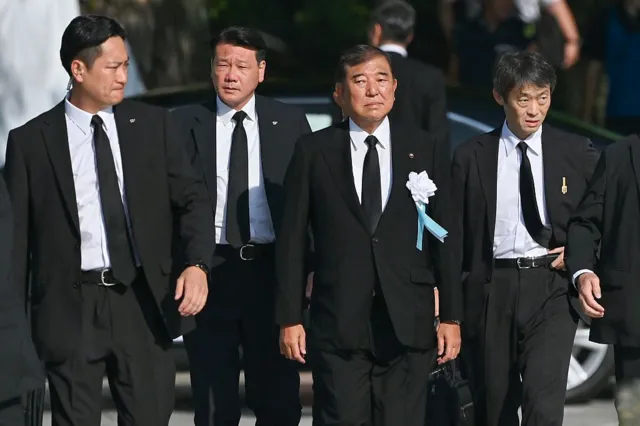As the world marks 80 years since the atomic bombing of Hiroshima, Japan’s Prime Minister Shigeru Ishiba has voiced concern that the global risk of nuclear conflict is higher now than in the past.
Survivors and experts alike are sounding the alarm, warning that the danger of nuclear war is now more imminent than it has been in decades.
In a poignant ceremony at the Hiroshima Peace Memorial Park on Wednesday morning, dignitaries and the few remaining hibakusha, atomic bomb survivors, gathered to mark the moment the U.S. dropped the “Little Boy” bomb on August 6, 1945.
That single strike, followed by another on Nagasaki three days later, killed over 110,000 people instantly, with many more succumbing to radiation sickness and injuries in the years that followed.
Those attacks remain the only time nuclear weapons have been used in conflict. Yet, the fear of their use persists and is intensifying.
“The world is now seeing a greater nuclear threat than ever before,” warned Japanese Prime Minister Shigeru Ishiba during the memorial.
He highlighted worsening global security and the widening rift over nuclear disarmament.
Nihon Hidankyo, the survivors’ advocacy group and last year’s Nobel Peace Prize recipient, echoed that concern. “Time is running out. We face governments with nuclear arms that dismiss our calls for change. That must shift — even if just a little,” their statement read.
Recent global tensions are reinforcing those fears. Ongoing hostilities between Russia and Ukraine have reignited nuclear rhetoric between Moscow and Washington.
The U.S. has targeted Iranian nuclear infrastructure to halt Tehran’s ambitions. Earlier this year, a flare-up between India and Pakistan over Kashmir once again pushed the world to the edge of potential catastrophe.
“There is a marked trend: growing nuclear stockpiles, more aggressive nuclear posturing, and the breakdown of arms control agreements,” said Hans Kristensen of the Stockholm International Peace Research Institute (SIPRI).
In January, the Bulletin of the Atomic Scientists inched its symbolic “Doomsday Clock” closer to midnight — now at a perilous 89 seconds. That’s the closest it’s ever been to signaling global annihilation. Though the movement was just one second forward from the previous year, experts urge it should be taken as a grave warning, not a small change.
The organization cited not only nuclear dangers but also climate change, biothreats, and emerging risks from artificial intelligence.
Still, their 2025 report put nuclear escalation at the center of concern.
“The nations armed with nuclear weapons are not just holding onto them — they’re expanding their arsenals and pouring billions into modernization,” the report noted.
An Expanding Arsenal
By modern standards, Hiroshima’s 15-kiloton bomb is relatively modest. Today, the largest weapon in the U.S. arsenal has a yield of 1.2 megatons, roughly 80 times more powerful.
A single such bomb dropped on a densely populated city could wipe out millions in seconds.
Currently, more than 12,000 nuclear warheads exist worldwide, controlled by nine nations: the U.S., Russia, China, France, the U.K., India, Pakistan, North Korea, and Israel. SIPRI reports that nearly all these states are engaged in ambitious modernization programs, creating new and deadlier weapons systems.
While the U.S. and Russia still account for around 90% of the global nuclear stockpile, other countries are catching up. China is adding about 100 warheads annually, with SIPRI predicting that growth will continue. India and the U.K. are also reportedly expanding their capabilities.
North Korea remains defiant. Kim Yo Jong, the influential sister of Kim Jong Un, made clear in July that Pyongyang has no intention of abandoning its nuclear weapons in exchange for dialogue with Washington or Seoul.
“Any denial of the DPRK’s status as a nuclear power will be flatly rejected,” she declared.
As the world reflects on the tragedy of Hiroshima and Nagasaki, the message from survivors and experts alike is stark: remembering the past is not enough. The urgent task is preventing history from repeating itself, this time, on a potentially apocalyptic scale.
